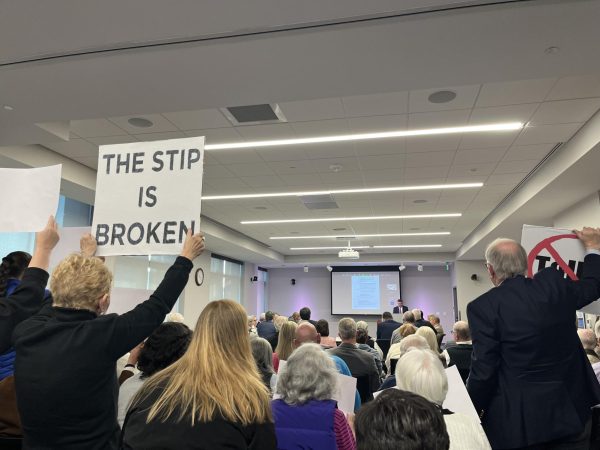Rhino horn trade: A recipe for disaster
April 23, 2017
Poaching has been around for as long as I can remember. Growing up, when people explained to me what poaching was, I always envisioned terrible things that people could do to these animals. But, now it seems like South Africa is leaning more towards rhino horn trade, as they have faced a serious poaching problem for years. My question is what good is actually going to come from this? Economically speaking I can see this potential change in trade to beneficial for the country of South Africa, but from an environmental stand point I am not so much in favor.
According to The Huffington Post, South Africa’s government will be going on with proposed plans to legalize the sale of rhino horn within the country. Edna Molewa, South Africa’s Minister of Environmental Affairs filed draft regulations back in February that stated it would allow the domestic sale of rhino horn for “personal reasons” as long as the individual possesses the correct permit.
Of course regulations will be made if this becomes legal. For example, according to The Huffington Post, individuals and foreign nationals would be only allowed to export a certain amount of the good, only through South Africa’s O.R. Tambo International Airport in Johannesburg.
Rhino horn, despite what some may believe, is actually in high demand. According to The Washington Post many nations in Asia believe that rhino horn possesses the cure for cancer and other ailments. In 2015, rhino horn could go for about $60,000 a pound. So, evidently being in the rhino horn business is that place to make big bucks, but for most it comes with a big cost as well. The Washington Post also reported that the United States also sees some rhino horn activity, even though most believe that these sorts of activities only happen in places like Africa.
While the United States may not be home to rhinos, the sale of rhino horn is not unheard of. PBS reported that a taxidermist in Iowa will be serving five years in prison after pleading guilty to selling black rhino horns to a trafficker.
So, what exactly are going to be the implications of legally allowing rhino horn trade in South Africa? Well, I see it going one of two ways; being incredibly good for the country or creating a much larger problem than already exists. Poaching in South Africa is already a big problem even though the government has done its best to combat such behavior. South Africa has a number of wildlife reserves, dedicated to protecting wildlife, however this does not prevent legal poaching as many would hope.
The Daily Mail recently discussed this very topic as two black rhinos were shot for their horns. According to The Daily Mail, Wozani, a black rhino living on a game reserve near Kruger National Park was slaughtered by poachers while many believe he was searching for his mate. The Daily News also reported that Wozani’s pregnant mate was also shot roughly a month ago by poachers. However, the poachers did not stop with removing Wozani’s horn only. They also hacked off his ears, a foot and his tail which some believe is a tactic to prove the rhino was from the wild, thus increasing their value.
This is just one example of the many poaching crimes that occur. According to the organization, Save the Rhino, at least 5,940 African rhinos have been poached since 2008. However, regulations and laws have not stopped these hunters because in 2015 alone, roughly 1,175 rhinos were killed in South Africa alone. The trend has also begun to spread to neighboring countries such as Namibia, reported Save the Rhino. At least 80 rhinos were poached in Namibia in 2015, when only two were reported in 2012. Save the Rhino stated that Africa overall has seen the highest levels of poaching in two decades.
So, what does all of this mean if South Africa legalizes rhino horn trade? Well, I suspect that poaching is only going to get worse throughout Africa, especially if people can now make a profit without the threat of the law (like that even stopped them before). Economically, speaking South Africa is most likely going to benefit from the legalization of rhino horn trade.
However, NPR reported that South African rhino breeders are requesting the legal sale of rhino horns in order to flood the market and decrease the overall cost of the horn. As I explained earlier, many Asian countries, particularly Vietnam, believe in potential medicinal qualities of rhino horn. Why science has yet to prove this to be true as of yet, this does not stop the overall belief in its healing power. Rhino horn is made of keratin, which is a protein found in human hair and nails.
But, if the cost of rhino horn decreases, I fear more people will start buying it. It becomes more affordable to those who have seen it as out of their price range, opening up the number of potential buyers. So, what exactly is the incentive there to stop poaching? While the draft does state that the horns would come from domestically raised rhinos, people will find a way to work around this law, as they have been doing now.
South Africa also proposed a separate regulation banning the powdering of rhino horn for three years because powdering the horn makes it more challenging to identify and easier to smuggle, reported NPR.
While South African officials are aware of the poaching problem their country faces, according to NPR, Edna Molewa stated, “These criminal gangs are armed to the teeth, well-funded and part of transnational syndicates who will stop at nothing to get their hands on rhino horn”. But all that has yet to stop them from proposing this new law. Many argue that by having a ban on the good, the demand continues to go up. However, others argue that opening rhino horn up to trade is dangerous because it allows illegal exports to more easily slip through the cracks.
South Africa needs to tread lightly on this one if you ask me. If this new law does go into effect and goes poorly, we might be reading about African rhinos instead of seeing them on Animal Planet. Also, if the African rhino were to go extinct due to horn trade, what animal would take its place for poaching? Elephants are already poached for their tusks and hunters already hunt lions and other African wildlife. The ecosystem is fragile thing and if South Africa isn’t careful, their new law might cause more harm than good.
This law is going to potentially make is so much easier for poachers to get away with killing wild rhinos. People always find a way around laws or regulations, even if they get caught in the end. But how many times will a poacher get away with it legally before they are caught, if they ever are? It’s not guaranteed this will fail; obviously it might make things better for South Africa. However, while this might be beneficial for the country economically speaking, I doubt it will be environmental beneficial.




















